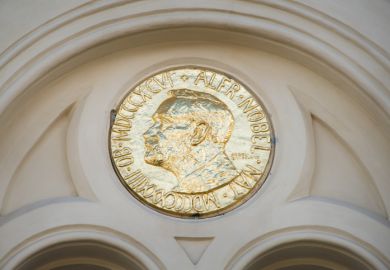The undergraduates we teach these days were nowhere when John F. Kennedy was assassinated or the Americans decided that Vietnam was a bad investment. Although some of them may have then been somewhere, they do not remember when Margaret Thatcher was first elected prime minister. The 20th century lasted a long time, and its medical history is generally much less well understood than that of the century that preceded it. We do not even possess an agreed periodisation comparable to earlier historical epochs.
This is not to suggest that 20th-century medical history is not being investigated: Roger Cooter and John Pickstone have gathered a team of 51 scholars, virtually all of whom can cite their own published work in their essays. Indeed, this volume is so timely precisely because of the sheer range of research into most aspects of yesterday's medicine and the paucity of synthetic accounts of it. This volume poses enough salient questions to set research agendas for some time.
It must be remarked, however, that this is simply a large collection of commissioned essays, not an encyclopedia. Most of the chapters are more concerned with interpretation than with conveying systematic information. Those who read the book from cover to cover will learn many new things and will be impressed with the basic level of accuracy. Anyone wishing to read a stimulating essay on colonial medicine, the crisis of the welfare state or childbirth will find this volume just the thing. Anyone wanting to know who developed kidney dialysis or when the first National Institute of Health was established can discover it only by persistence. Few contributors follow Jennifer Stanton's lead in providing a table laying out landmarks of the topic in hand. Most of the essays are completely self-contained, with just the very occasional cross-reference. Only a handful of the individuals discussed are even given birth and death dates.
The volume's claims to reference status are further diminished by a patchy and inadequate index. Plays, films and novels such as Whose Life Is It Anyway? and One Flew over the Cuckoo's Nest are mentioned several times, but the index would not help you find where. "Dialysis" and "kidney dialysis" are both in the index, but you would have to look at both entries to guide you to all the relevant pages. Whether an individual mentioned in the text is included in the index appears to be arbitrary. In a volume of this size, importance and pretension, this is a shame.
These niggles are redeemed, however, by the range and quality of the chapters themselves. In 46 chapters, the past century's medicine is scrutinised from many angles. The editors have divided the essays into three sections of roughly equal size: "Power", "Bodies" and "Experiences". The first section invites us to reflect on the wider political and social frameworks in which medicine as an institution and a set of practices developed. Pickstone's opening essay offers a felicitous periodisation of the century's dominant medical ideologies into those of "productionism" (concern with improved efficiency and better health for workforces and armies), "communitarianism" (medicine as part of evolving welfare states), and "consumptionism" (the rising power of market forces within medicine). The first ideology flourished until the second world war, the second until the 1970s, and we are still under the influence of the last. Pickstone's triptych has much to recommend it, so it is unfortunate that none of his subsequent authors engages with it.
Nevertheless, the section on "Power" is full of strong chapters, including nicely paired contributions by Michael Worboys and Randall Packard on colonial and post-colonial medicine, and Charles Webster and Rudolf Klein on the construction and deconstruction of the welfare state. Klein documents that "de-welfarism" in western economies is as much about rhetoric as hard figures, although Thatcher should not be allowed to escape completely.
The editors apologise in the introduction for the Anglo-American bias of the volume. The apology is appropriate, although several of the chapters do look beyond the Anglo-American axis. The former USSR and China are given separate essays, the Soviets under "Power", the Chinese under "Experiences".
The "Bodies" section is the longest and, in some ways, the most awkward. We are offered a whole range of 20th-century bodies, including healthy, sexual, disabled, experimental, ethical, third-world and genetic. Any reader going through the volume consecutively would be partially immunised to the current fashion of analysing "bodies" by the vaguely sardonic introductory essay by Mark Jenner and Bertrand Taithe on the "historiographic body". While these authors take this genre seriously, they are also well aware of the difficulties it poses.
Some of the essays in this section are distinguished, for example Cooter's on the ethical or Sonu Shamdasani's or Mark Micale's on the psychoanalytic and psychiatric, respectively, but this section betrays the restraints of treating immunology, genetics, pathology and other medical sciences as simply manifestations of "seeing" a particular kind of "body".
The final section, "Experiences", is perhaps more coherent, even if Stanton's wide-ranging chapter on "Supported lives" (insulin-dependent diabetes, chronic renal dialysis, intensive care units) seems more appropriate for "Bodies", and most people would think of "Surgeons" (by Christopher Lawrence and Tom Treasure) as fitting better in "Power".
Aids and malaria are the only specific diseases meriting separate chapters, although the variety of diseases we group in the singular as "cancer" also has its own essay. Several of the authors contributing to this section examine patients and others: parturient women, children, the aged or the mentally ill. Nurses and health workers here become part of medical experience rather than part of its power structure. Julian Tudor Hart's essay on "Going to the doctor" dissects general practice from below in a wonderfully evocative and amusing way.
Despite many other fine things to be found in this volume, there are also some curious gaps. There is virtually nothing on heart disease and nothing at all on strokes or dementia. Common scourges such as multiple sclerosis and asthma rate one mention between them. An appreciation of the importance of chronic disease in the 20th-century medical landscape would have to be teased out from incidental discussions in several different chapters. Epidemiology, demography and medical economics are under-represented. The association between smoking and lung cancer is accepted but its discovery never described, much less analysed. Four separate chapters offer good treatment of psychiatry and the related disciplines of psychology and psychoanalysis, but medical specialisms in general are not well served.
A cynic might conclude from this catalogue that history is not what happened, it is what historians choose to write about. There is some truth in this, and even more in the reflection that history is always at least as much about the present as the past. This helps explain the high visibility of Aids in a volume devoted to a whole century; but it makes the absence of medical audit, negligence and fraud slightly puzzling.
But if I want more, it is because 738 pages of text only whetted my appetite (there is nothing in the volume on depraved eating disorders). This collection is hardly the last word, but it does remind us forcefully of two features of contemporary medical historical practice. First, health is so central to modern culture (and its politics and economics) that medical history will become even more closely integrated into what one could call "ordinary" history. At the same time, it is a discipline that draws on a whole range of expertises and bodies of knowledge. The contributors to this volume have many different affiliations: sociology, anthropology, women's studies, social policy, community health, history of science; there are even a couple of practising doctors. The volume strikes me as relatively jargon-free. The writing varies a great deal in its elegance, but meanings are always clear.
Finally, the variety of voices reflects a healthy range of approaches and outlooks. Some of the individuals who dominated medical historiography two decades ago, such as Michel Foucault and Thomas McKeown, still cast their shadows, but even if Foucault's legacy can be seen in two of the volume's three section titles, his dark vision of human beings and their history no longer confines contemporary historians. His Madness and Civilisation fails to achieve "further reading" status in any of the psychiatric essays. Rather, these authors do what historians do best: read, think and write. And the reading seems mostly of the traditional sort: curiously for a book published in the 21st century about the century that made the computer central to our lives, no one refers us to a website. The book may be around for a while yet.
W. F. Bynum is professor of the history of medicine, Wellcome Trust Centre for the History of Medicine, University College London.
Medicine in the 20th Century
Editor - Roger Cooter and John Pickstone
ISBN - 90 5702 479 9
Publisher - Harwood
Price - £75.00
Pages - 756



